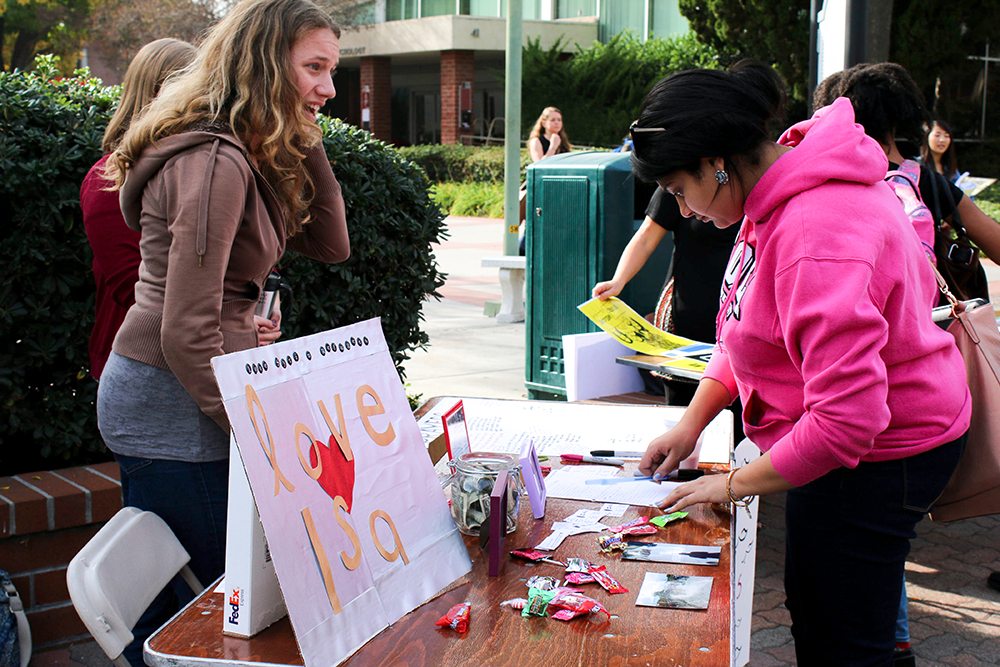Europe is facing its worst refugee crisis since World War II, according to the UN. For individuals like Christine Kazar, who graduated from Biola last spring, this crisis is a reality. This summer, she lived in Hungary with her family, who are missionaries there. The family of Heather Spradley, a senior philosophy major, has also witnessed the refugee crisis first-hand — they are missionaries in Macedonia through Send International.
Helping
Kazar and Spradley wanted to help. At Biola and in their local churches, they saw that others want to help in this situation as well, but no one knows how.
“It seems like there’s little we can do since we’re so removed from it,” Kazar said.
Encouraged by a missionary friend and a Biola professor, Spradley started a project called Love Isa. Her goal was to raise $5,000 for Send International to put towards purchasing coats and supplies for refugees.
Spradley and Kazar chose to name the project after a common Arabic name which sounds like the word for “Jesus.”
“We are naming people who are on their feet, on the run right now,” Kazar said. “We’re also naming their refuge [Jesus] who we hope they can get to know through our love.”
Small Sacrifice, Big Impact
The theme verse for the project is Matthew 25:40: “Truly I tell you, whatever you did for one of the least of these brothers and sisters of mine, you did for me.”
The Love Isa team encourages students to spread the word via social media and word of mouth. Students are also encouraged to make small sacrifices that could have a great impact.
“What you would spend on a Starbucks coffee could get someone a warm coat,” Spradley said.
Spradley and Kazar have had tables around campus, spoken in classrooms and reached out to churches to promote Love Isa. On Wednesday, Dec. 9, Spradley and Kazar set up a table at a prayer rally for refugees at the Biola Bell Tower.
Space to Stand
Tom Crisp, a philosophy professor who holds a doctorate and one of the organizers of the event, wanted to create a space for Christians to take a stand in a time of injustice.
Crisp believes that since the UN has compared the current refugee crisis to the Holocaust, a time in which so many Christians did not stand with those being persecuted, Christians have a responsibility to show Christ’s love.
“In the name of the love that Jesus taught, which teaches us we need to love our neighbor as ourself, we need to seek our neighbor’s well-being as we would seek our own well-being, and that lines of race and religion and class and ethnicity don’t matter,” Dr. Crisp said.
Coming Together
He helped organize the rally as a chance for the Biola community to come together and stand with the Syrian refugees.
“We need to stand up and say, ‘This is not ok. These are children of God whom Jesus calls us to love. We’re not going to just stand by and watch this happen,’” Dr. Crisp said.
Love Isa provides a practical way for people in the Biola community to help the refugees from Syria and Macedonia.
“It’s been really cool to see the response of people who were already wanting to do something for refugees but they felt really helpless. And then they found us,” Spradley said.
Providing and Sharing
While the project is mostly about showing the refugees love by providing practical things, Macedonian missionaries such as Spradley’s parents have been able to share the gospel with some refugees.
“That’s a really exciting thing about the refugee crisis, is that [the refugees] are going to western countries where they have the opportunity to hear the gospel,” Spradley said.
In addition to raising funds, Spradley has been able to independently organize a mission trip to Macedonia this January. The trip will include Spradley and five other Biola students.
Get Involved
Thanks to the support of students and other donors, Love Isa has nearly reached its goal. Spradley’s new goal is to raise as much money as possible for the Love Isa campaign before Dec. 18.
Students can get involved with Love Isa by spreading the word, liking the Love Isa Facebook page or by making a donation to Love Isa.







